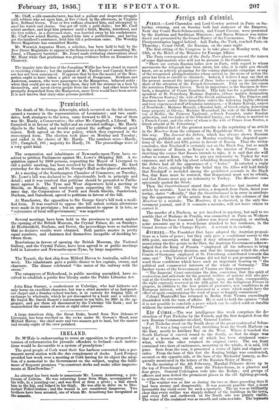Vtuviuriat.
The death of Mr. George Arkwright, which occurred on the 5th instant, caused a vacancy in the representation of Leominster ; and two candi- dates, both strangers to the town, came forward to fill it. One of them was Mr. Hardy, a Conservative ; the other Mr. Campbell, a Liberal. Mr. Campbell is in favour of the ballot and an extended suffrage ; Mr. Hardy Objects to the ballot, and would not extend the suffrage without good reason. Both agreed on the war policy, which they expressed in the stereotyped form. The election took place on Monday and Tuesday ; and ended in the choice of Mr. Hardy. The numbers were—Hardy, 179 ; Campbell, 101; majority for Hardy, 78. The proceedings were of a very quiet kind.
The corporation and inhabitants of Newcastle-upon-Tyne have re- solved to petition Parliament against Mr. Lowe's Shipping Bill. A re- quisition signed by 2000 persons, requesting the Mayor of Liverpool to call a public meeting, has been received by that functionary. He fixed yesterday for the meeting, and St. George's Hall as the place of assembly.
At a meeting of the Southampton Chamber of Commerce, on Tuesday, Mr. Lowe's bill was declared to be objectionable both in principle and detail ; and it was resolved that petitions should be presented to Parlia- ment against it. The Tyne and Wear shipowners held a meeting at Shields, on Monday, an resolved upon supporting the bill. On the same day, the Corporations of North and South Shields, Sunderland, Durham, and Gateshead, agreed to petitions in favour of the bilL At Manchester, the opposition to Sir George Grey's bill took a modi- fied form. It was resolved to oppose the bill unless certain alterations were made in its provisions ; but an amendment to oppose it in toto, as "subversive of local self-government," was negatived.
Several meetings have been held in the provinces to protest against the opening of the British Museum, the Crystal Palace, &c. on Sundays. At Huddersfield, Durham, and Dover, the proceedings were so turbulent that no decisive results were obtained. Both parties muster in pretty equal numbers, and chairmen feel themselves incapable of deciding be- tween them.
Resolutions in favour of opening the British Museum, the National Gallery, and the Crystal Palace, have been agreed to at public meetings held in Leicester and Newcastle-upon-Tyne, by large majorities.
The Transit, the first ship from Milford Haven to Australia, sailed last week. The inhabitants gave a public dinner to her captain, owner, and .charterer. The dinner celebrated. "the union of the railway with the ocean."
The ratepayers of Birkenhead, in public meeting assembled, have re- solved to establish a public free library under the Public Libraries Act.
John King Gurney, a confectioner at Uxbridge, who had hitherto not only borne an excellent character, but was a strict member of an Independ- ent chapel and a Sunday-school teacher, is in custody for forging bills of exchange by wholesale, which he got dscoanted by a bank and a solicitor. Re forged Mr. David Bassett's indorsement to ten bills, for 3601. in the ag- gregate, and got them all discounted by the Uxbridge Old Bank ; and he counterfeited the names of seven or eight other persons.
A large American ship, the Great Duke, bound from New Orleans to Liverpool, has been wrecked on the rocks under St. Gowan's Head, near Milford Haven : the chief mate and two seamen got to land, but the master and twenty-eight of the crew perished.


























 Previous page
Previous page